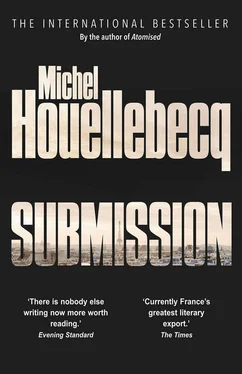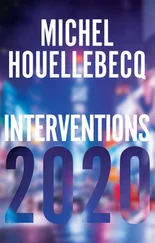Over the years, the rise of the far right had made things a little more interesting. It gave the debates a long-lost frisson of fascism. Still, it wasn’t until 2017, and the presidential run-off, that things really started to heat up. The foreign press looked on, bewildered, as a leftist president was reelected in a country that was more and more openly right wing: the spectacle was shameful but mathematically inevitable. Over the next few weeks a strange, oppressive mood settled over France, a kind of suffocating despair, all-encompassing, but shot through with glints of insurrection. People even chose to leave the country. Then, a month after the elections, Mohammed Ben Abbes announced the creation of the Muslim Brotherhood. There had already been one attempt to form an Islamic party, the French Muslim Party, but it soon fell apart over the embarrassing anti-Semitism of its leader — so extreme that it drove him into an alliance with the far right. The Muslim Brotherhood learned its lesson and was careful to take a moderate line. It soft-pedalled its support of the Palestinians and kept up good relations with the Jewish religious authorities. As with Muslim Brotherhood parties in the Arab world — and the French Communists before them — the real political action was carried out through a network of youth groups, cultural institutions and charities. In a country gripped by ever more widespread unemployment, the strategy broadened the Brotherhood’s reach far beyond strictly observant Muslims. Its rise was nothing short of meteoric. After less than five years, it was now polling just behind the Socialists: at 21 versus 23 per cent. As for the traditional right, the Union for a Popular Movement (UMP) had plateaued at 14 per cent. The National Front, with 32 per cent, remained far and away the leading party of France.
In recent years David Pujadas had graduated from news anchor to national icon. Not only had he joined the ‘select club’ of political journalists (Cotta, Elkabbach, Duhamel, a few others) who alone, in the history of the media, had been deemed worthy to moderate a presidential debate between the general election and the run-off, but he had outshone all his predecessors when it came to courtesy, firmness and calm. He knew how to shrug off an insult, how to settle a fight when it started turning into a brawl, and how to give the whole proceeding a dignified, democratic veneer. The National Front and the Muslim Brotherhood agreed to have him as their moderator, and certainly no primary debate had ever been more eagerly awaited: the Muslim Brotherhood candidate had been rising in the polls since the beginning of his campaign. If he managed to take the lead from the Socialists, the run-off would be historic, and very hard to predict. The left, despite repeated and increasingly dire calls from their own dailies and weeklies, refused to back a Muslim. The right, whose numbers continued to grow, seemed ready, despite their leaders’ very firm proclamations, to cross over and support a ‘national unity’ candidate. So Ben Abbes was playing for high stakes — no doubt the highest stakes of his life.
The debate took place on a Wednesday, which wasn’t ideal: the day before, I’d bought an assortment of microwave Indian dinners and three bottles of red wine. A high-pressure system had settled over Hungary and Poland, which prevented the low-pressure system over England from moving south; across continental Europe, the weather was unseasonably cold and dry. My doctoral students had been annoying the hell out of me with their lazy questions, mainly about why minor poets (Moréas, Corbière, etc.) were considered minor, and who said they couldn’t be considered major (like Baudelaire-Rimbaud-Mallarmé, then Breton). Their questions were not disinterested, far from it. They were bad students with bad attitudes — one wanted to do his dissertation on Cros, the other on Corbière — but today I could see their hearts weren’t really in it, they just wanted to hear me give the establishment line. I punted, and recommended Laforgue as a compromise.
As soon as the debate started, I was fucked. Or rather, my microwave was fucked. It started doing something new (spinning round and emitting an almost inaudible hum, but without heating the food), which meant I ended up having to cook my Indian dinners on the hob and missed the opening speeches. Still, as far as I could tell the whole thing was almost excessively polite. The two candidates for the highest office in the land showered each other with tokens of mutual respect, took turns expressing their immense love of France, and agreed about more or less everything. And yet, at the same time, clashes broke out in Montfermeil between right-wing extremists and a group of young Africans of no declared political affiliation. There had been fighting all week following the desecration of a local mosque. The next day a nativist website claimed that these last riots had been extremely violent, with several fatalities, a claim immediately disputed by the Ministry of the Interior. As always, the leaders of the National Front and Muslim Brotherhood published statements vigorously condemning any criminal acts. Two years before, when the riots started, the media had had a field day, but now people discussed them less and less. They’d become old news. For years now, probably decades, Le Monde and all the other centre-left newspapers, which is to say every newspaper, had been denouncing the ‘Cassandras’ who predicted civil war between Muslim immigrants and the indigenous populations of Western Europe. The way it was explained to me by a colleague in the classics department, this was an odd allusion to make. In Greek mythology, Cassandra is a very beautiful young maiden (‘like the golden Aphrodite’, Homer writes). Apollo, having fallen in love with her, offers her the gift of prophecy in exchange for her favours. Cassandra accepts his gift, only to refuse the god’s advances. Enraged, Apollo spits in her mouth, meaning that no one will ever understand or believe anything she says. She goes on to predict the rape of Helen by Paris, then the Trojan War, and she alerts her fellow Trojans to the ruse of the Greeks (the famous ‘Trojan Horse’) that allows them to capture the city. She winds up assassinated by Clytemnestra, but not before predicting her own murder and that of Agamemnon, who refuses to believe her. In short, Cassandra offered an example of worst-case predictions that always came true. In hindsight, the journalists of the centre-left seemed only to have repeated the blindness of the Trojans. History is full of such blindness: we see it among the intellectuals, politicians and journalists of the 1930s, all of whom were convinced that Hitler would ‘come to see reason’. It may well be impossible for people who have lived and prospered under a given social system to imagine the point of view of those who feel it offers them nothing, and who can contemplate its destruction without any particular dismay.
But in fact, the media’s attitude had changed over the last few months. No one talked about violence in the banlieues or race riots any more. That was all passed over in silence. They’d even stopped denouncing the ‘Cassandras’. In the end the Cassandras had gone silent, too. People were sick of the subject, and the kind of people I knew had got sick of it before everyone else. ‘What has to happen will happen’ seemed to be the general feeling. The next evening, when I went to the spring launch of the Journal of Nineteenth-Century Studies , I knew the riots in Montfermeil would be talked about less than the presidential debates, and much less than recent university appointments. The party was being held in the rue Chaptal, at the Museum of the Romantics, which had been hired for the occasion.
I’d always loved Place Saint-Georges, with its charming belle époque facades, and I stopped for a moment in front of the bust of Gavarni before I walked up the rue Notre-Dame-de-Lorette, then the rue Chaptal. At number 16 I found the short, tree-lined alley that led to the museum.
Читать дальше







